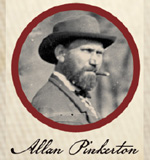
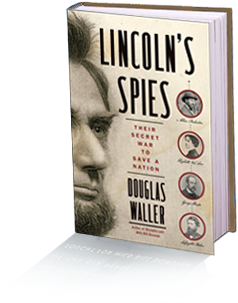 Allan Pinkerton (1819-1884) Friends said Allan Pinkerton was gifted with unusual powers of observation. Born in Scotland, as a young man he trained to be a barrel maker, but he ended up spending more time working as a labor agitator. In 1842, Pinkerton emigrated to America with his young wife, eventually settling in Chicago, where he founded a private detective agency in the mid-1850’s that became highly successful. As a detective he honed a sixth sense to anticipate criminal activity before it happened. He was stubbornly persistent, refusing to be worn down by adversity. After the Civil War began in spring 1861, Pinkerton, who by then had become famous nationwide as a private eye, joined Union General George McClellan’s force to serve as his spymaster.
Allan Pinkerton (1819-1884) Friends said Allan Pinkerton was gifted with unusual powers of observation. Born in Scotland, as a young man he trained to be a barrel maker, but he ended up spending more time working as a labor agitator. In 1842, Pinkerton emigrated to America with his young wife, eventually settling in Chicago, where he founded a private detective agency in the mid-1850’s that became highly successful. As a detective he honed a sixth sense to anticipate criminal activity before it happened. He was stubbornly persistent, refusing to be worn down by adversity. After the Civil War began in spring 1861, Pinkerton, who by then had become famous nationwide as a private eye, joined Union General George McClellan’s force to serve as his spymaster.
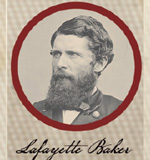 Lafayette Baker (1825-1868) Lafayette Baker, a handsome man, with brown hair, a full red beard, and piercing gray eyes, was a fine horseman and a crack shot. Fed up with his father, an insufferably stern Puritan, Baker renounced God and ran away from his Michigan home in his late teens, largely uneducated save for a little schooling that taught him to read and write. For the next ten years he drifted from job to job through a dozen states, often having to flee a city after a gunfight with another man. He finally ended up in San Francisco by the mid-1850’s, joining a vigilante group that rounded up suspected criminals in the lawless city. When the Civil War started, Baker, who was back on the East Coast, rode into Washington, hoping to land a good-paying job with the Union Army. He managed to talk General Winfield Scott, the Army’s aging commander, into hiring him as a secret service agent.
Lafayette Baker (1825-1868) Lafayette Baker, a handsome man, with brown hair, a full red beard, and piercing gray eyes, was a fine horseman and a crack shot. Fed up with his father, an insufferably stern Puritan, Baker renounced God and ran away from his Michigan home in his late teens, largely uneducated save for a little schooling that taught him to read and write. For the next ten years he drifted from job to job through a dozen states, often having to flee a city after a gunfight with another man. He finally ended up in San Francisco by the mid-1850’s, joining a vigilante group that rounded up suspected criminals in the lawless city. When the Civil War started, Baker, who was back on the East Coast, rode into Washington, hoping to land a good-paying job with the Union Army. He managed to talk General Winfield Scott, the Army’s aging commander, into hiring him as a secret service agent.
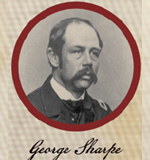 George Sharpe (1828-1900) His superiors considered George Sharpe a natural military leader, with a magnetic personality that made men want to follow him. In the breast pocket of Sharpe’s uniform coat he kept a small, well-thumbed book of verses by his favorite poets, which he routinely read to his men. Sharpe was born in Kingston, New York on the Hudson River. The son of a wealthy merchant, he attended elite academies as a youngster, graduated from Rutgers University with honors, and earned a law degree from Yale University. Before setting up his practice, Sharpe spent four years in Europe, studying French in Paris and working as a secretary in the U.S. legations in Vienna and Rome. When the war broke out, he first commanded a company of federal militiamen and later led an infantry regiment as a colonel. It prepared Sharpe for the most important job he would have as the Union Army’s preeminent spymaster.
George Sharpe (1828-1900) His superiors considered George Sharpe a natural military leader, with a magnetic personality that made men want to follow him. In the breast pocket of Sharpe’s uniform coat he kept a small, well-thumbed book of verses by his favorite poets, which he routinely read to his men. Sharpe was born in Kingston, New York on the Hudson River. The son of a wealthy merchant, he attended elite academies as a youngster, graduated from Rutgers University with honors, and earned a law degree from Yale University. Before setting up his practice, Sharpe spent four years in Europe, studying French in Paris and working as a secretary in the U.S. legations in Vienna and Rome. When the war broke out, he first commanded a company of federal militiamen and later led an infantry regiment as a colonel. It prepared Sharpe for the most important job he would have as the Union Army’s preeminent spymaster.
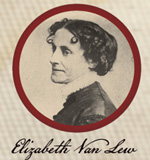 Elizabeth Van Lew (1818-1900) Elizabeth Van Lew’s father was a wealthy Richmond hardware merchant. Her mother was a highly educated socialite, who stocked the library of their mansion with almost 600 books. Van Lew, who developed an early empathy for slaves, was sent to relatives in Philadelphia to be educated. A governess there lectured her on abolitionism and she returned to Richmond with an even fiercer hatred of human bondage. She was a short woman, who had been quite beautiful in her youth. But when the Civil War started, Van Lew was in her forties and unmarried—considered by Richmond society to be an old maid. When Union prisoners began pouring into Richmond, Van Lew cajoled Confederate authorities into letting her bring meals and books to the POWs. It soon made her a pariah in her city. But Van Lew couldn’t be intimidated. Soon she headed up a large and powerful spy ring in the capital of the Confederacy.
Elizabeth Van Lew (1818-1900) Elizabeth Van Lew’s father was a wealthy Richmond hardware merchant. Her mother was a highly educated socialite, who stocked the library of their mansion with almost 600 books. Van Lew, who developed an early empathy for slaves, was sent to relatives in Philadelphia to be educated. A governess there lectured her on abolitionism and she returned to Richmond with an even fiercer hatred of human bondage. She was a short woman, who had been quite beautiful in her youth. But when the Civil War started, Van Lew was in her forties and unmarried—considered by Richmond society to be an old maid. When Union prisoners began pouring into Richmond, Van Lew cajoled Confederate authorities into letting her bring meals and books to the POWs. It soon made her a pariah in her city. But Van Lew couldn’t be intimidated. Soon she headed up a large and powerful spy ring in the capital of the Confederacy.